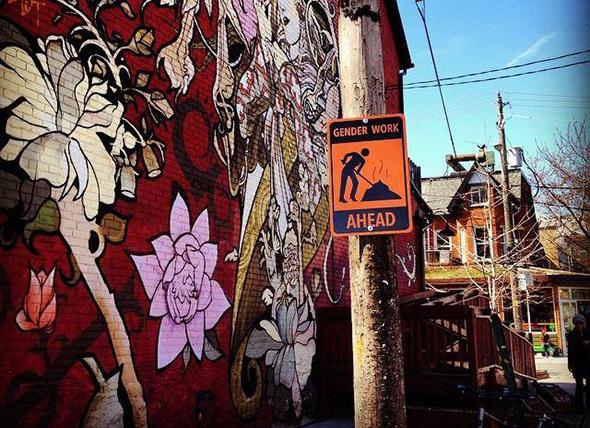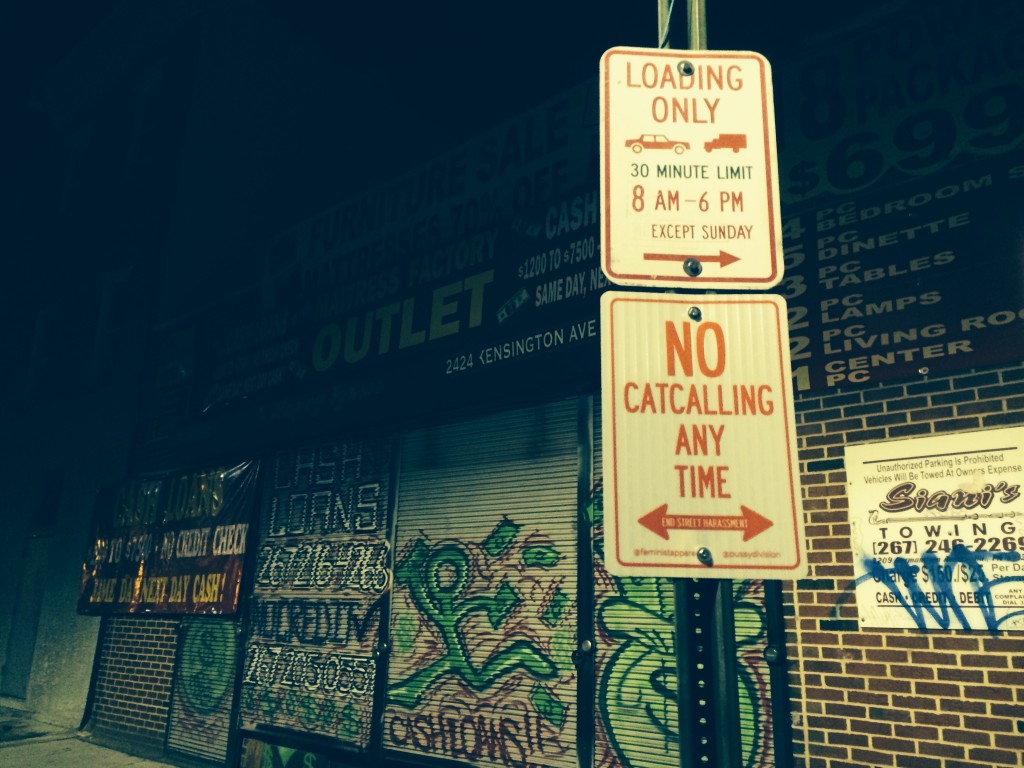Innovative street signs went up in Toronto, New York City and Philadelphia during International Anti-Street Harassment Week last week.
Toronto (via blogTO):
 “A new public art project in Kensington Market kindly asks catcallers to STFU. Dubbed the The Street Talk Project, the artistic intervention involves street signs that admonish sexual harassment on Toronto streets and that support equal rights for women and trans* people.
“A new public art project in Kensington Market kindly asks catcallers to STFU. Dubbed the The Street Talk Project, the artistic intervention involves street signs that admonish sexual harassment on Toronto streets and that support equal rights for women and trans* people.
“Using humour and subversive advertising, The Street Talk Project [brings] attention to the ways in which public space is navigated differently by different people,” reads the organizers’ description of the project. It also addresses “how sexism is felt viscerally on a day-to-day basis” and promotes “solidarity for the safety of women and trans* people.”
The project debuted yesterday and also involves an exhibition at Whippersnapper Gallery. There are seven signs in total, which have been installed around the Market. The idea was to place them in a highly trafficked area to generate as much discussion as possible.”
New York City and Philadelphia (via my article at Feministing.com):
 “Members of Feminist Apparel and Pussy Division put up 25 street signs against catcalling in Philadelphia and New York City. They worked with a street sign manufacturer to produce them and released them specifically for International Anti-Street Harassment Week. Their goal was to create ‘further dialogue surrounding the issue of street harassment,’ Alan Martofel, production coordinator for Feminist Apparel, told me.
“Members of Feminist Apparel and Pussy Division put up 25 street signs against catcalling in Philadelphia and New York City. They worked with a street sign manufacturer to produce them and released them specifically for International Anti-Street Harassment Week. Their goal was to create ‘further dialogue surrounding the issue of street harassment,’ Alan Martofel, production coordinator for Feminist Apparel, told me.
Since it is a form of guerrilla activism, they did not gain permission from the city to post the signs and they are unsure how long they will be up. But they say that already they are having an impact.
One of the members of Pussy Division, a group based in Philadelphia who has done other street art activism, such as posting “stop rape” stickers and spray painting anti-harassment messages on sidewalks around the city, told me, ‘We’ve had so much positive feedback. A lot of people will share harassment that just happened to them and say they are happy to see the sign and feel less alone.’
For her, the goals of the project are to spread the message that street harassment is an important issue everywhere and to help survivors. ‘We would like people who deal with street harassment every day to look at it and feel validated about their feelings of really hating going through it and feeling objectified.’ She continued, ‘We are taught — especially women — that this is part of life and that we should deal with it and be happy about it. But we’re not happy about it. It’s important for harassed people to hear from other people who are on the same page as them.’

